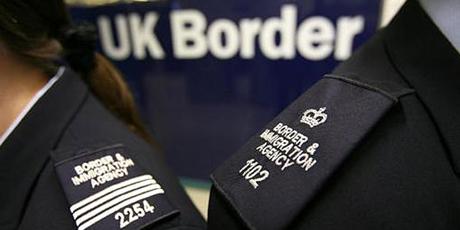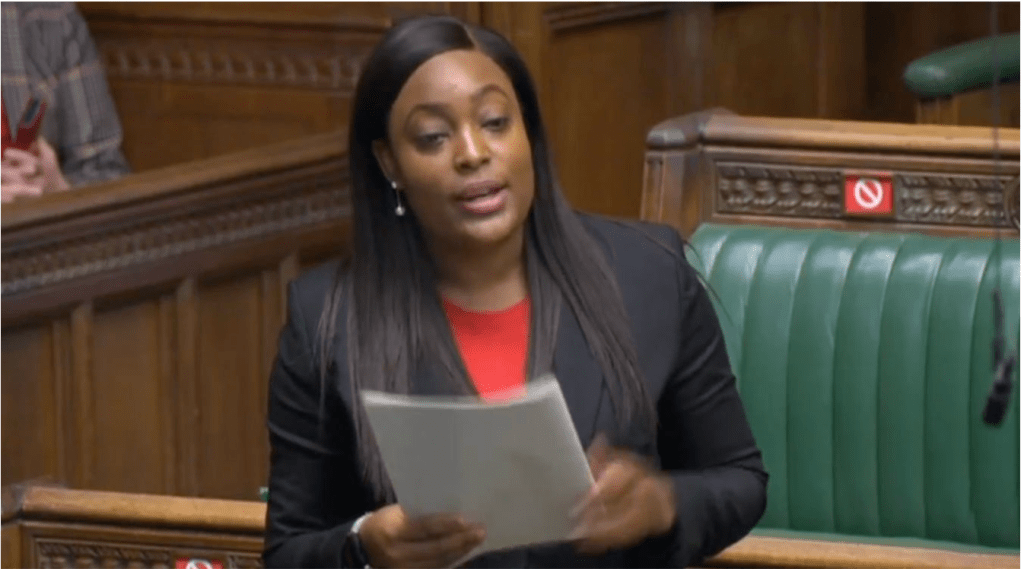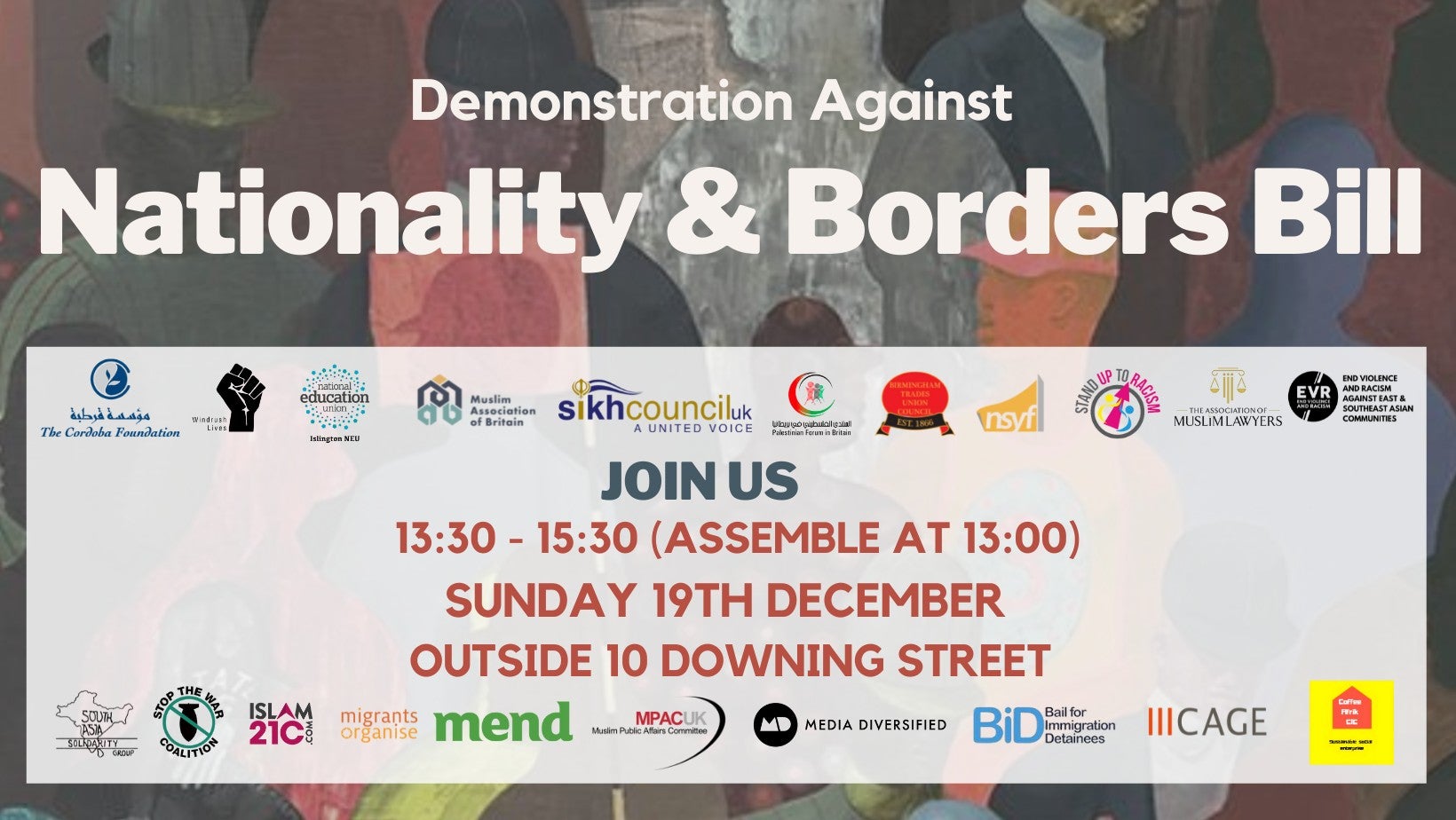‘The most racist legislation in my lifetime’: Protest at Nationality and Borders Bill reaches Downing Street
Numerous equalities organisations will come together in a mass demonstration against the bill on Sunday at 1pm outside 10 Downing Street

Your support helps us to tell the story
From reproductive rights to climate change to Big Tech, The Independent is on the ground when the story is developing. Whether it's investigating the financials of Elon Musk's pro-Trump PAC or producing our latest documentary, 'The A Word', which shines a light on the American women fighting for reproductive rights, we know how important it is to parse out the facts from the messaging.
At such a critical moment in US history, we need reporters on the ground. Your donation allows us to keep sending journalists to speak to both sides of the story.
The Independent is trusted by Americans across the entire political spectrum. And unlike many other quality news outlets, we choose not to lock Americans out of our reporting and analysis with paywalls. We believe quality journalism should be available to everyone, paid for by those who can afford it.
Your support makes all the difference.Tens of thousands of people have called for the Nationality and Borders Bill to be scrapped. On Sunday, organisations including Media Diversified, the Muslim Association of Britain, South Asian solidarity group, Stand up to Racism, the Association of Muslim Lawyers, Bail for Immigration Detainees (BID) and Windrush Lives will come together in a mass demonstration outside 10 Downing Street.
Anger is focused on Clause 9 of the bill, covering “notice of decision to deprive a person of citizenship”. It exempts the government from having to give notice of removing a person’s citizenship if is not “reasonably practicable”.
In effect, individuals could be stripped of their British citizenship without warning, which is set to disproportionately affect millions of black, Asian and minority ethnic citizens.
MPs approved the bill on its third reading earlier this month despite criticism from all sides of the Commons. It will now go to the House of Lords where it will be debated at its second reading stage on 5 January.
Although Labour leader Keir Starmer voted against the bill, the top of the opposition has been accused of not being vocal enough in its denunciation of the proposed law.

Taiwo Owatemi, the shadow equalities minister, told The Independent that allowing the Home Office to remove citizenship without any warning or notice, given the Windrush scandal, is “very alarming” for millions of dual-nationality citizens.
“The Nationality and Borders Bill is a sham. Its tough-sounding measures are unworkable and it breaks key international humanitarian conventions,” she said.
“The new draconian powers to deprive a person of their British citizenship without any warning are deeply worrying – particularly in light of the Windrush scandal in which this Conservative government oversaw the wrongful detainment, deportation and denial of legal rights to British citizens with every right to live in the UK.
“Once again it is black, Asian and ethnic minority people who look to be hit hardest by a Conservative government which denies that structural racism even exists. Labour would introduce a Race Equality Act to tackle structural racial inequality at source.”
Even parts of the media have been accused of inadequate coverage around this matter despite good-natured pledges of solidarity with the plight of marginalised groups following last year’s Black Lives Matter activity.
“The media is the second most socially exclusive profession in the country,” said Media Diversified. “Could this lack of diversity explain why the Nationality and Borders Bill, which is causing so much distress and alarm in minority communities, isn’t higher up on the agenda?
“In an industry that is 94 per cent white, most folk won’t have to worry about their citizenship being conditional or having to pay a higher price for their mistakes and a two-tier system of citizenship simply because of their heritage.”
The government has reserved the right to strip dual nationals of their British citizenship since 2006 in circumstances “deemed to be conducive to the public good” while in 2014 it became possible for foreign-born British citizens without dual nationality to be deprived of citizenship and be made stateless, in situations where they would otherwise be eligible for foreign citizenship.
The difference now is that the individual stands to lose the right to be notified of this and the legislation can be applied retrospectively to those who currently don’t have British citizenship.

Patricia Williams, 58, from London, told The Independent: “This law will means that every black and brown person residing in Britain, born to migrant parents, like me, are effectively second-class citizens in our own country. How is that right?
“To be honest, I’ve gleaned most of the information around this act and how it will impact people like me from Twitter, as opposed to through mainstream news platforms. I’m frustrated that something like this has been allowed to happen in 2021.
“It’s the most racist piece of legislation that I’ve seen in my lifetime.”
Windrush Lives, an advocacy group and victim support network led by Windrush victims, described the bill as “racist, xenophobic and an affront to basic human decency”.
“The bill sticks two fingers up at black, brown and racialised Britons and the inclusion of Clause 9 is astounding given what we know happened to so many of the Windrush generation,” said a spokesperson from the organisation.
“Lawful British citizens and residents were stripped of their status with no warning, many were deported, and some died overseas. Many others remain in exile. Home Office ministers have said the clause won’t affect the right to appeal, and won’t be applied widely.
“Windrush victims are living proof that those words mean nothing (...). We don’t even know the full scale of the wrongdoings the Home Office has already committed, and here it is seeking the power to commit even more, on an even broader basis.”
The spokesperson added: “The home secretary’s utter contempt for black, brown and racialised people couldn’t be plainer.”

Abdi Hassan, founder of east London-based community organisation Coffee Afrik CIC, said the bill “is driven by ideology, lacks thought and is at best disingenuous – and at worst consciously racist”.
Under justice secretary Dominic Raab, the government is also planning an overhaul of the Human Rights Act which will aim to stop people facing deportation asserting their rights to a family life. It means that if a person is stripped of their British citizenship and is facing deportation, it will be harder for them to appeal the decision in a court of law.
Again, this move is expected to disproportionately affect marginalised communities and has been widely condemned by both MPs and campaigners.
The government, and the Home Office in particular, have as recently as this week come under fire for human rights breaches by numerous black claimants.
The Home Office said some of the criticism of the legislation were based on “inaccurate interpretations of administrative changes”.
“Removing British citizenship has been possible for over a century, and is used against those who have acquired citizenship by fraud, and against the most dangerous people, such as terrorists, extremists and serious organised criminals,” said a spokesperson.
“This change is simply about the process of notification and recognises that in exceptional circumstances, such as when someone is in a war zone, or informing them would reveal sensitive intelligence sources, it may not be possible to do this.”
Join our commenting forum
Join thought-provoking conversations, follow other Independent readers and see their replies
Comments